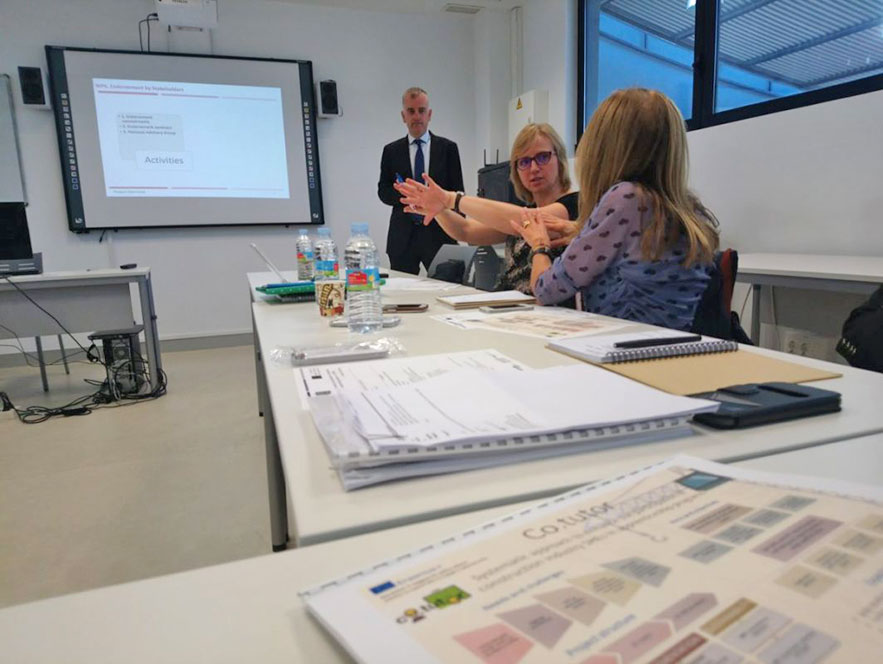

On October 5, the members of Co.Tutor met at the Madrid facilities of the Fundación Laboral de la Construcción, to advance this European project on improving the participation of SMEs in the construction sector, in the Dual Vocational Training programs or other similar systems that provide internships in companies. The initiative is led by the Fundación Laboral de la Construcción,, and has the participation of the National Confederation of Construction -CNC- (Spain), Associazione Nazionale de Costruttori Edili -Ance- (Italy) and Ente per la Formazione e l ‘ addestramento professionale nell’edilizia -Formedil- (Italy).
In this third meeting of the project, was present Vytaute Ezerskiene, representative of the Education, Audiovisual and Culture Executive Agency -Eacea-, who attended to follow the project firsthand , know the initial results, and offer improvements and recommendations.
Achieve a global framework of departure
The first results of Co.Tutor, which are already available in English for consultation and download on the project website, are a «Report on good practices in the field of learning in Europe and identification of barriers that limit the participation of SMEs. Spanish and Italian in this type of programs» and the consequent «Strategic roadmap» to be followed for its improvement.
With the aim of achieving a global European framework on the current situation of learning in companies, in the European Union, successful experiences of the eurozone have been studied, so that SMEs become more intensely involved in learning programs, through the participation through interviews with twelve experts from ten countries, including those from Germany, Denmark, Finland, France and Norway.
On the other hand, to deepen the situation of Spain and Italy, two working groups were organized in each partner country of the project, in which 38 experts participated, with which an exhaustive analysis of the restrictions and obstacles was carried out. SMEs in the construction sector face their participation in apprenticeship programs. Programs that involve the reception of trainees enrolled in Dual Training and other systems, where the practices in the companies are carried out along with the coordination and the formative line of an educational center.
The subsequent “Strategic Roadmap” established by the Co.Tutor project, which adapts to the needs and characteristics of SMEs in the construction sector in Italy and Spain, defines a total of 12 main barriers for that 35 specific measures have been proposed to deal with them, together with 14 specific strategic recommendations for the execution of said measures.
Among the obstacles considered most important are those related to the lack of training culture in companies -especially in SMEs-, as well as the lack of information on learning and Vocational Education and Training (VET), and the regulatory deficiencies.
But other identified barriers also stand out, which coincide even with those encountered by other more advanced countries in the matter, such as: the few economic advantages for the company, the little motivation in favor of young people, the lack of awareness on the part of Institutions and companies, an educational system and a labor market that are not closely linked, the impact on productivity or a negative sectorial image.
Actions to strengthen the quality, offer and image of learning in Europe
The actions aimed at addressing these barriers posed by the project CoTutor are in line with the European Alliance for Apprenticeships -EafA-, whose main objective is to strengthen the quality, supply and image of the learning in Europe.
The recommendations set out in the «Strategic Road Map» of Co.Tutor are the following:
- Open institutional communication channels to inform and involve SMEs in VET.
- Carry out direct campaigns and informative open doors days.
- Propose a white paper to reinforce the culture of training in SMEs.
- Generate guidance and information services towards learning programs.
- Create a register of participating companies in learning.
- Make diffusion campaigns.
- Design a decalogue of learning benefits.
- Propose a white paper for improvements in current legislation.
- Make a proposal to the Public Administration.
- Create a support guide of tasks and functions for the tutor-company.
- Develop a system for assessing the performance of the tutor.
- Generate a standardized document about the competences of the students.
- Do a practical exam for apprentices.
- Create a list of recognition of older workers who act as tutors in the company.
Limitations of Spain and Italy
Keep in mind that Spain and Italy are two of the countries where youth unemployment rates are highest, reaching 40.7% and 48.8%, respectively, according to 2015 data from the Organisation for Economic Co-operation and Development (OECD). In addition, the same source indicates that both areas occupy the top positions in Europe when it comes to unemployed young people without studies: 27.6% and 25.8%, respectively.
On the other hand, the «Strategy for a sustainable competitiveness of the construction sector and its companies» that the European Commission communicated to the European Parliament and Council in 2012, warns that the construction sector will need more than two thirds of posts qualified for the year 2026, due to the evolution of the sector and the replacement of workers of retirement age. A reality for which companies, training centers and workers must be prepared.





